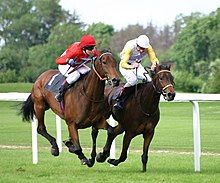User:BleakBlue/sandbox

Equine Science and Management
[edit]Equine Science and Management is a combination of animal husbandry, animal science, breeding, community leadership and development, agricultural economics, and business. It can also serve as a basis for pre-veterinary majors. The major itself is very diverse and can be used to work and study any breed of horse.
Internships
[edit]Equine Science and Management degrees practically require experience through a farm or an internship before any permanent work takes place, especially depending on the concentration of the major. Many farms in Kentucky offer paid internships or part time jobs, such as KEMI, the Kentucky Equine Management Internship.[1] KEMI is available for students attending college or recent graduates looking to earn experience in the field; KEMI also provides an excellent opportunity to get acquainted with those already in the profession.
Agricultural Economics and Business
[edit]
While earning a degree in Equine Science and Management you can choose to focus more specifically on equine science, which has a greater emphasis on biology and pre-veterinary medicine, or on equine management, which focuses more on working closely with horses in the horse industry, such as on a farm.[2] There are various entry level jobs working hands-on, such as a groom, riding coach, and a stable manager.[2]
Hands-On Work
[edit]There are plenty of ways to gain experience through either internships or volunteer work with horses. The racetrack in Lexington, Kentucky, Keeneland, is one example of a place to work and to network with other well-known horse-owners and racers. In addition, there are tons of farms that are always looking for part and full time workers. The University of Kentucky also overs classes and aids in finding internships for students that provide the hands-on experience needed to enter the field.
After- Graduate Jobs
[edit]There are plenty of jobs to pursue with an Equine Science and Management degree:
Barn Foreman[3]
Boarding Facility Manager[3]

Broodmare Manager[3]
Dude Ranch Manager[3]
Farrier[3]
Racetrack Manager[3]
Stallion Manager[3]
Yearling Manager[3]
Equine Dentist[3]
Geneticist[3]
Lab Technician[3]
Veterinarian[3]
Veterinarian Technician[3]
Acupuncture[3]
Massage Therapist[3]
Rehabilitation Therapist[3]
Therapeutic Riding Instructor[3]
Auctioneer[3]
Bloodstock Agent[3]
Horse Sales[3]
Nutrition Rep[3]
Pharmaceutical Sales[3]
Stallion Seasons[3]
Extension Educator[3]
College Faculty[3]
Researcher[3]
Editor[3]
Equine Artist[3]
Event Planner[3]
Graphic Designer[3]
Journalist[3]
Photographer[3]
Social Media Coordinator[3]
Website Designer[3]
Accountant[3]
Lawyer[3]
Real Estate Agent[3]
Program Coordinator[3]
Field Director[3]
Executive Director[3]
Course Designer[3]
Groom[3]
Rider[3]
Trainer[3]
Clinicians[3]
Jockey[3]
Outrider[3]
Riding Instructor[3]
Wrangler[3]
Community Leadership and Development
[edit]A big part of entering into the field of Equine Science and Management is becoming known throughout the community; being associated with a large or well-known farm can enhance your opportunities and experiences in the field. Particularity the field of Thoroughbred racing can be competitive, weather it comes down to handling yearlings, or on foal watch at night. Knowing the right people is imperative to succeeding in any field of Equine Science and Management.

Industry Issues
[edit]There are many controversial topics that are equine related, such as stem cell therapy and cloning.
Stem Cells
[edit]Stem cells can be derived from the blood, fat, and bone marrow, which can be very invasive to a horse. Stem cells are also specific to that one and only animal and cannot be used on other horses. Unless stem cells have been previously collected from a specific horse, who would now benefit from their use, then collecting and going through the process of separating these stem cells would be more trouble than it is worth. Stem cells can also be collected from a horse at birth by using the placenta and freezing it in storage for later use.
Cloning
[edit]Though horses have been successfully cloned before, these animals have encountered other problems. Horses that have been cloned usually develop aging diseases at much earlier ages then normal, as well as having digestive track problems. The cloned animal carries the same genes as the original animal that was cloned, but they can be expressed in a different sequence, such has having a different coat pattern. In addition, the cloned animal will not be an exact copy of the original, nor will it act or behave the same. However, the cloned animal, in theory, still has the same genetic potential.
- ^ "Kentucky Equine Management Internship: About KEMI". www.kemi.org. Retrieved 2017-01-23.
- ^ a b "What Can You Do With An Equine Science Degree? - WithMyDegree.org". WithMyDegree.org. 2014-05-14. Retrieved 2017-01-23.
- ^ a b c d e f g h i j k l m n o p q r s t u v w x y z aa ab ac ad ae af ag ah ai aj ak al am an ao ap aq ar as at au av aw ax ay az ba bb bc bd be bf bg "POSSIBLE CAREERS IN THE EQUINE INDUSTRY" (PDF). Retrieved January 23, 2017.

